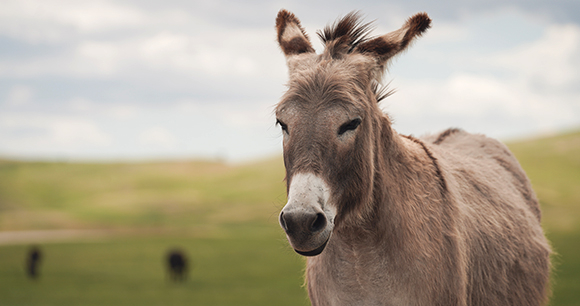
Washington, DC—Today, US Rep. Don Beyer (D-VA) reintroduced the bipartisan Ejiao Act to ban the sale and trade of donkey-hide gelatin products in the United States; a recent survey shows that 71% of Americans support the bill.
The July online survey of more than 2,000 US adults was commissioned by the Animal Welfare Institute (AWI) and conducted by The Harris Poll. In addition to indicating strong support for the Ejiao Act, the survey found that an overwhelming majority of Americans (83%) agree that the production of ejiao raises animal welfare concerns, while 80% agree that the steep decline in global donkey populations due to increasing demand for ejiao is unacceptable.
Ejiao (pronounced “eh-gee-yow”) is a gelatin made from boiling the hides of donkeys. It is used primarily in cosmetics and traditional Chinese medicines. Despite little scientific evidence of its purported health benefits, demand for ejiao is increasing dramatically in China and other countries. The United States is the third-largest importer of products containing ejiao, after Hong Kong and Japan, with approximately $12 million in annual imports each year. Nearly 6 million donkeys are slaughtered annually to produce ejiao—a rate that could halve the world’s donkey population in the next few years.
This cruel global trade causes tremendous animal suffering and severely impacts communities that rely on donkeys for survival. Donkeys fetch water from miles away, take kids to school, assist in construction and farming, transport goods and produce to market, and even carry the elderly to the hospital. To meet the demand for ejiao, some donkeys are stolen from their owners and transported long distances in overcrowded trailers without food, water, or adequate rest. Infections or broken limbs are left untreated, and those who die in transport may be skinned on the spot—with their remains discarded by the side of the road. Those who survive the journey are often bludgeoned to death on arrival.
“Americans increasingly recognize that the ejiao trade is senseless and poses grave risks to donkeys around the world,” said Joanna Grossman, Ph.D., equine program director and senior policy advisor for AWI’s Farmed Animal Program. “The production of donkey-hide gelatin entails immense suffering without conferring the promised health benefits. Passing the Ejiao Act would establish the United States as a global leader in shutting down ejiao sales.”
Originally introduced in 2021, the Ejiao Act would prohibit the transport, sale, and purchase of ejiao products, as well as donkeys and donkey hides for the production of ejiao. Penalties under this legislation mirror those under the Lacey Act—widely regarded as one the strongest federal laws in the United States to protect a wide range of species from illegal trade and exploitation.
“The trade and production of ejiao is an inhumane and dangerous business that is leading to the mass slaughter of donkeys and causing widespread harm to impoverished communities around the world,” Beyer said. “More and more people in poorer countries are seeing animals upon which they depend stolen and killed to meet demand from the ejiao trade. Our bill would ensure the United States does not engage in the ejiao trade in any capacity and instead supports safer, more cost effective, and humane alternatives.”
Other key findings from The Harris Poll survey:
- More than 7 in 10 Americans (71%) say they support the Ejiao Act, including 41% who say they strongly support this bill.
- Seventy-one percent of Americans would not consider purchasing food and beauty products, or traditional health remedies made from donkey skins; only 1% have used ejiao products.
- Sixty-six percent believe it is not acceptable to produce gelatin using donkey skins.
- More than half of Americans (53%) feel concerned about the growing demand for ejiao.
- Eighty-two percent agree that restrictions on the ejiao trade are necessary to protect rural communities that depend on donkeys for daily life.
Despite pressure from advocates, online retailers such as Amazon and Etsy continue to sell ejiao products in the United States. Consumers looking to avoid purchasing anything containing ejiao should read product information and ingredient lists carefully. Related terms include “donkey hide,” “donkey glue,” “donkey-hide gelatin,” “donkey skin plastic,” “donkey oil,” and “colla corii asini” (Latin for “donkey neck hide”), or iterations using “ass” in lieu of “donkey.”
Survey Method:
This survey was conducted online within the United States by The Harris Poll on behalf of Animal Welfare Institute from July 22–24, 2025, among 2,084 adults ages 18+. The sampling precision of Harris online polls is measured by using a Bayesian credible interval. For this study, the sample data is accurate to within +/- 2.5 percentage points using a 95% confidence level. This credible interval will be wider among subsets of the surveyed population of interest. For complete survey methodology, including weighting variables and subgroup sample sizes, please contact [email protected].
Marjorie Fishman, Animal Welfare Institute
[email protected], (202) 446-2128
The Animal Welfare Institute (awionline.org) is a nonprofit charitable organization founded in 1951 and dedicated to alleviating animal suffering caused by people. We seek to improve the welfare of animals everywhere: in agriculture, in commerce, in our homes and communities, in research, and in the wild. Follow us on Facebook, Instagram, Threads, Bluesky, and LinkedIn for updates and other important animal protection news.